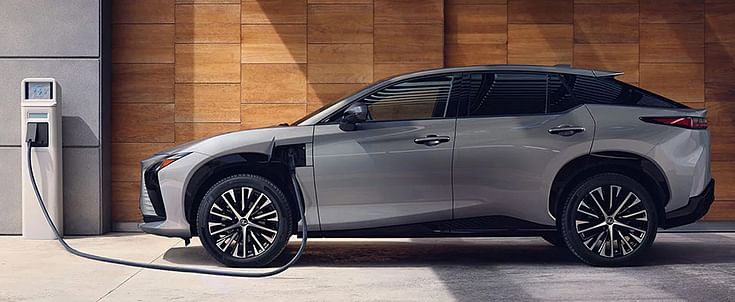Denso develops its first inverter with SiC chips, used in Lexus RZ e-axle
Highly efficient silicon carbide chips significantly reduce power loss in electric vehicles
Denso Coporation has developed its first-ever inverter with silicon carbide (SiC) semiconductors. This inverter, which is incorporated in the eAxle, an electric driving module developed by BluE Nexus Corporation, will be used in the new Lexus RZ. The RZ is Lexus’ first dedicated battery electric vehicle (BEV) model has been recently launched.
SiC power semiconductors consist of silicon and carbon that significantly reduce power loss compared to silicon (Si) power semiconductors. A cruising test conducted under specific conditions by BEVs using SiC semiconductor inverters demonstrated inverters with SiC power semiconductor reduce power loss less than half of ones with Si semiconductor. As a result, the energy efficiency of BEVs is improved and cruising range is extended.
According to Denso, SiC power semiconductors with Denso’s unique trench-type metal-oxide-semiconductor (MOS) structure improve the output per chip as they reduce power loss caused by heat generated. The unique structure achieved high voltage and low on-resistance operation.
 Denso inverter, which is incorporated in the eAxle, an electric driving module developed by BluE Nexus Corporation, will be used in the new Lexus RZ EV.
Denso inverter, which is incorporated in the eAxle, an electric driving module developed by BluE Nexus Corporation, will be used in the new Lexus RZ EV.
Key elements of new inverter
Based on the high-quality technology jointly developed by Denso and Toyota Central R&D Labs, Denso utilises SiC epitaxial wafers. As a result, Denso has halved the number of crystal defects that prevent the device from operating normally due to the disorder of the atomic arrangement of the crystal. By reducing crystal defects, the quality of SiC power semiconductor devices used in vehicles and their stable production are ensured.
Denso calls its SiC technology ‘RevoSic’, and uses it to comprehensively develop technologies for products ranging from wafers to semiconductor devices and modules such as power cards.
RELATED ARTICLES
Autoliv Plans JV for Advanced Safety Electronics With China’s HSAE
The new joint venture, which is to be located strategically near Shanghai and close to several existing Autoliv sites in...
JLR to Restart Production Over a Month After September Hacking
Manufacturing operations at the Tata Group-owned British luxury car and SUV manufacturer were shut down following a cybe...
BYD UK Sales Jump 880% in September to 11,271 units
Sales record sets the UK apart as the largest international market for BYD outside of China for the first time. The Seal...






 By Autocar Professional Bureau
By Autocar Professional Bureau
 06 Apr 2023
06 Apr 2023
 8379 Views
8379 Views





 Ajit Dalvi
Ajit Dalvi




